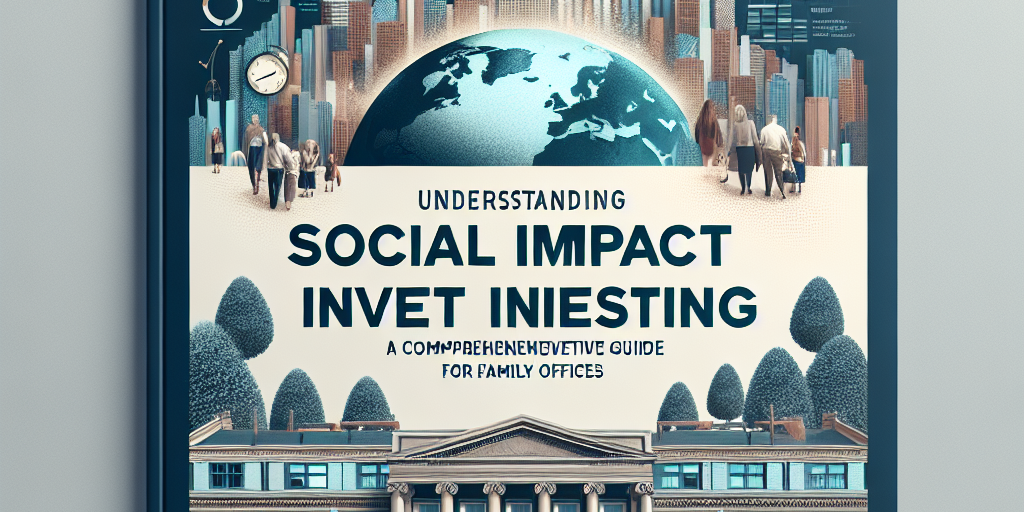Introduction
In recent years, the financial landscape has seen a transformational shift towards a more inclusive and sustainable investment approach. This shift has given rise to social impact investing, a strategy that seeks not only financial returns but also positive social and environmental outcomes. For family offices—private wealth management advisory firms that serve affluent families—understanding and integrating social impact investing can present both an opportunity and a challenge. This comprehensive guide will explore the essentials of social impact investing and offer insights to help family offices navigate this emerging sector.
What is Social Impact Investing?
Social impact investing involves the allocation of capital to businesses, organizations, and funds with the intention of generating measurable social and environmental impact alongside a financial return. Unlike traditional philanthropy, which focuses solely on charitable outcomes, social impact investing aims to create sustainable solutions to pressing global issues such as poverty, climate change, healthcare access, and education.
The Importance of Social Impact Investing
Growing Demand: Investors are increasingly seeking to align their financial portfolios with their values. A 2021 report by the Global Impact Investing Network (GIIN) stated that the global impact investing market has reached $715 billion.
Risk Mitigation: Companies with strong environmental, social, and governance (ESG) practices tend to perform better over the long term, making them potentially lower-risk investments.
Legacy and Values: For family offices, social impact investing allows families to leave a legacy aligned with their values and mission, which can foster intergenerational wealth and purpose.
- Opportunity for Innovation: Impact-driven investments often support innovative solutions that can disrupt traditional markets, offering family offices a chance to invest in forward-thinking businesses.
The Framework for Social Impact Investing
1. Defining Objectives
Family offices must begin by defining their social impact investment objectives. Are they looking to focus on specific sectors such as renewable energy, education, or healthcare? Are there particular social issues that resonate with the family’s values? Establishing clear goals will guide investment strategies.
2. Investment Approaches
Social impact investing can take various forms, including:
Direct Investments: Investing directly into startups or existing companies that have a social mission.
Funds: Allocating capital to impact funds managed by firms specializing in social impact investments.
- Hybrid Models: Combining traditional investments with philanthropic initiatives, such as creating a fund where returns are reinvested into social causes.
3. Measuring Impact
While financial returns are important, impact measurement is critical to the success of social impact investments. Family offices should implement frameworks such as the Global Impact Investing Network’s IRIS+ system, which helps in measuring, managing, and optimizing impact.
4. Risk Assessment
Understanding the risks associated with social impact investing is essential. Family offices should conduct thorough due diligence, which includes assessing the financial viability of potential investments and the sustainability of their social impact.
The Role of Family Offices in Social Impact Investing
Family offices are uniquely positioned to champion social impact investing for several reasons:
Long-Term Investment Horizon: Family offices can be more patient capital providers. Unlike traditional investment vehicles, which may prioritize short-term gains, family offices can afford to take a longer view on investments, allowing them to support projects that might take longer to yield returns.
Access to Networks: Family offices often have robust networks that can connect them with other investors, social entrepreneurs, and organizations in the impact investing sector.
- Philanthropic Funds: Many family offices already allocate funds for charitable activities. By aligning these activities with investment strategies, they can create a more cohesive financial and social impact strategy.
Challenges and Considerations
While the benefits of social impact investing are clear, family offices must be aware of several challenges:
Complexity of Impact Measurement: Defining and quantifying impact can be difficult, and there is a lack of standardization in measuring social outcomes.
Potential Trade-offs: There is often a perception that social impact investments deliver lower financial returns than traditional investments. While this isn’t universally true, family offices must evaluate their risk-return preferences.
- Market Saturation and Competition: As social impact investing gains popularity, the increased competition for quality investments could drive valuations higher and limit opportunities.
Conclusion
Social impact investing presents a unique and strategic opportunity for family offices to align their financial goals with their values, creating a positive influence in society while still pursuing profitable investments. By taking the time to understand the fundamentals of this growing field, family offices can position themselves not only as financial stewards but also as changemakers in tackling some of the world’s most pressing challenges.
As the landscape of investing continues to evolve, embracing social impact investing may well define the legacy of many family offices for generations to come.











